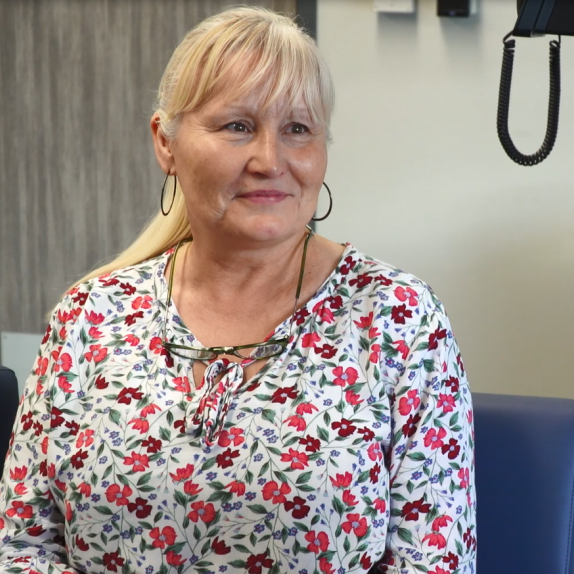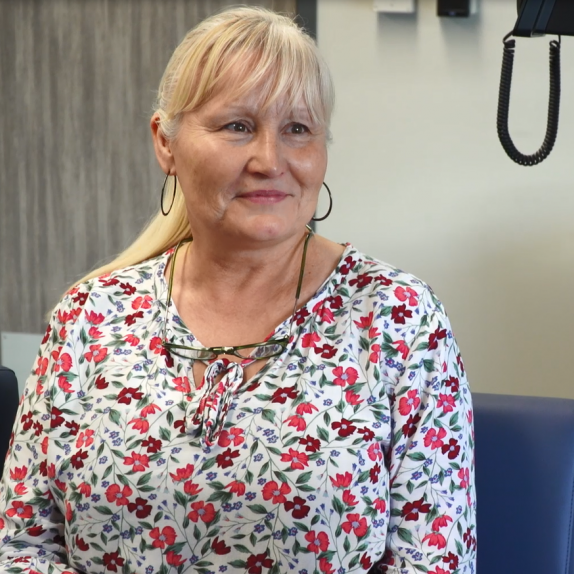Our Hospital, Our StoriesHand in Hand, Side by Side
Posted on: Jan 22, 2020When mental health services are set up, the focus is naturally on the client. But there are often unaddressed stresses experienced by those closest to a person experiencing mental illness or addiction: their family.

Statistics show that two-thirds of caregivers report being worried, anxious or depressed due to a family member's mental illness. Whether it's getting their loved one to a clinic, talking to doctors at appointments, or trying to help with income support, family members are often the de facto care team for their loved ones whose mental health has become a challenge.
While seeking out services for their loved ones, family members rarely look for support for themselves.
The Addiction and Mental Health Access 24/7 clinic, which opened earlier this year, this unaddressed need is being met through the provision of family peer support workers, who guide and support family members in parallel to their loved ones receiving support.
"A lot of people don't understand how devastating, stressful, worrisome it is for the family members," said Karolyn, a Family Support Worker at the Access 24/7 clinic.
Karolyn understands because she's been there too.
Four years ago, she was like many of the parents she meets today: uncertain, scared, and isolated. When she felt at a loss to continue supporting her family member alone, she reached out to a therapist. At that time, ACCESS Open Minds, a walk-in clinic for young people, had just opened, and she was able to get connected to a support group for parents, a connection for which she was incredibly grateful.
Though her family member didn't initially agree to get connected to services, the group allowed her to learn more about mental illness and meet other parents going through similar experiences. It was there that she met Kathy, a family support worker, who made the most significant difference in her journey.
"She could relate," said Karolyn. "She'd gone through the same experience. Kathy was the leader of the support group; a group that made me aware of the support available for family members of those facing addiction or mental illness. Without the group, I wouldn't be in the role I am today."
Karolyn feels privileged to be able to pass along her knowledge and use her lived experience as a way to connect with other families.
When someone calls or walks into Access 24/7, they're greeted and connected to a mental health therapist for an assessment. When a family member accompanies them or calls on their behalf, which is often the case, a family support worker like Karolyn is there to provide support.
Karolyn can help explain the process to family members through assessing their current level of understanding, sharing the care plan and helping them to understand what will happen next. This process takes the uncertainty out of what can be a very stressful situation.
"Most family members don't understand what the path to wellness will look like for their loved one or how they can help. The unknown is scary. As a family support worker, I can explain the process, share how to keep in touch, explain how to communicate with doctors, and provide a general understanding which removes some of the fear."
Karolyn also connects families with support for themselves, such as uniting them with a support group or mental health literacy training. "Families need to become resourceful, and that's what I empower them to do. The path to wellness might be a long one or a journey that has no end. At the same time, I also try to instil hope in them. No matter what point they are at currently, I help them to see the path forward."
Family support workers often meet families at their lowest point, usually in crisis—nights of sitting up with their family members, very little sleep, and sometimes even in the company of police.
Karolyn's role is to be a friend, advocate, and guide, helping families get through the day and prepare them for the future. Many families experience intense isolation and fear of facing future stigma. Having someone to walk beside them sends a message that they're not alone.
"Up until the moment we meet they've felt completely isolated advocating for their loved ones, and now someone is advocating for them to understand what's going on," says Karolyn. "Getting to speak to someone in a friendly, non-clinical manner allows them to let their guard down. They feel comfortable with us because we have walked in their shoes, and we come from a place of compassion. The care we provide is all about relationship building and creating a sense of belonging within a community where everyone is going through the same thing. That is powerful."
"Life calms down, and naturally that is our hope for all families, but when a crisis hits again, they're able to call and use our services. That is the definition of success for us."
